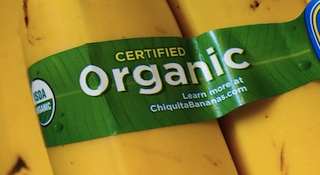
It's just one way I know with my own lying eyes that organic food is doing great. If I had a piece of that, I'd be walking around with a little smile on my face for everybody. And I'd certainly not lose my smile and my optimistic outlook toward my product over one academic study.
But that appears to have happened. I fully understand there is no central command and control structure for the organic industry. But they should have come to me for advice because this is a bunch of people now acting against their own best interests.
Ever since Sept. 3rd, when the Stanford University School of Medicine came out with a study which found that the nutritional values of organic and non-organic foods are no different, the organic movement has been fighting like a man in quicksand -- the more it struggles, the worse it gets.
I know, I know. We live in an era of instant response politics, smash-mouth journalism and the 10-minute news cycle. We have the In-Your-Face Book and the Twitter thing for people who fight with their thumbs.
Lost is any sense of judgment or strategy. It's like watching those old gladiator movies where every fight scene with the big swords looks exactly like the last one. Every part of the body politic, including trade associations, non-government organizations and nonprofits has access to marvelous communications tools these days.
Unfortunately, there are more tools than brains. Had all these organic gladiators only come to me first. I would have explained that when you have sales going to $24.4 billion in 2011, up from 3.4 billion in 1997, you don't want to do anything that would foul that up. I'd want to use a stronger word that "foul."
So, my advice about what to do about the Stanford U study would come down to just two words: Shut up. Maybe four words: Shut up about it.
Instead, the organic industry and its followers are executing the usual playbook against Stanford, its researchers and evil corporations -- some named and some not. All they've accomplished is spreading the Stanford study to a wider and wider audience.
Not smart.
Nothing needed to be defended and no offense was required. The best thing for the organic industry is the status quo because its been a great growth strategy. Why knock over the organic apple cart? It's like rioting in your own neighborhood.
We of the great unwashed public like having choices. Organic foods give us the choice to avoid pesticides or fertilizers and/or antibiotics and grow hormones. This also works out really well for the organic industry. Most evil corporations do not have a growth rate anything like the one being experienced in organics. My advice is don't mess it up.
But they did not ask for my advice, and instead they've managed to keep the Stanford study in the news for the past two weeks with no end in sight. For example:
- Tom Philpott, writing in Mother Jones, says the Stanford study sold organics short by not discussing five other concerns he has about pesticides.
- Lynn Pepples in Huffington Post went through a list of everything that might stick to discredit the Stanford study. To her credit, she knocked down some of the ones most obviously made up (like the study was funded by Cargill).
- Groups like the Cornucopia Institute have been reacting like it was a five-alarm fire. Their message seems to be that eating non-organic fruits and vegetables is on par with smoking cigarettes.
These are but a handful of examples in a case study of how a 24-hour story can get stretched out to a month. We see this more and more. It's like people have forgotten or never knew that the quickest way to kill a story you don't like is silence.
"The biggest surprise with the news that organic food was no healthier or safer than conventional was how many people were surprised," our colleague Greg Johnson, editor of The Packer, opined.
Just as organic and conventional foods both bear an equal burden of food safety, we never expected much difference in nutritional values. Consumers pay the big bucks for organics because they are concerned about their exposure to pesticides or fertilizer in produce or they think there is a risk from antibiotics or grown hormones in meat.
All the organic industry should have said is that it remains proud of its produce and happy to give consumers a choice. Then it should have -- you guessed it -- shut up. It's riding the up escalator with no end yet in sight.





